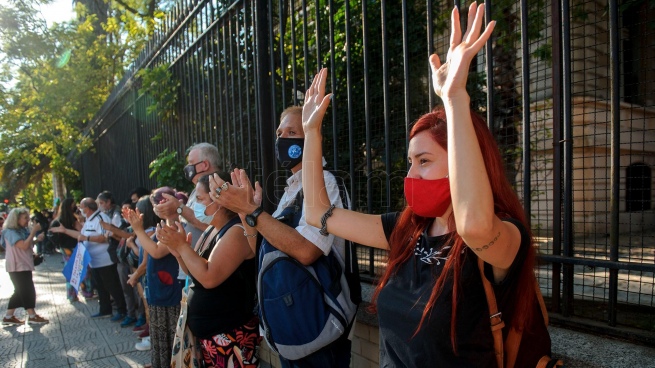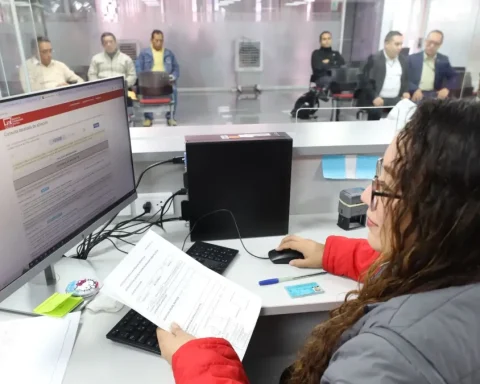Families from 22 schools in the City of Buenos Aires will reject this Thursday with a symbolic hug to an establishment in the Colegiales neighborhood the decision of the Buenos Aires Government to extend school hours to a full day, considering it “incompatible” with their routines and for “the little information on these changes”, which are part of a national resolution that calls for extending class hours at the primary level, to which 20 provinces have already adhered.
“We do not agree to extend the simple day to the full day because the school does not have the necessary infrastructure, such as a cafeteria and enough bathrooms, and the classrooms are going to be overcrowded,” the mother of a sixth-grade boy told Télam. the 12 Gran Mariscal del Perú Ramón Castilla school, in district 9, where the hug will take place at 12:30 and other establishments will participate.
In addition, he stated that the measure “would expel boys and girls with disabilities because many cannot sustain more hours and schools will no longer be inclusive.”
The Ramón Castilla school, located in Colegiales, is attended by 500 students, of which 20% have a disability and therapeutic companions.
what families say
The woman explained that about 22 Buenos Aires schools were organized in a WhatsApp group to “resist the reconversion of single-day schools to full-time schools,” a decision that, according to what she indicated, was reported orally by the local government a few days ago. for implementation in September and October.
The official decision for that school was reversed “until at least next year” due to the mobilization of several families who rejected it, he said.
He added that his son “doesn’t mind being in a school for 8 hours and they force me to change him to a private one a year after he finishes primary school or to one that remains a simple day, which will be overcrowded because many with different problems will be accumulated there. “, he explained and added that the rest of the schools have not yet received notification that the measure will be reversed.
For her part, Laura Echeverría, mother of a fifth-grade student at the Captain Enrique Guillermo Parker Elementary School 14, in district 12, with a single shift, shared her situation.
“I decided to change it in September to another single-day school and choose which one, because ten days ago they sent us a survey from the City Government asking us if we agreed with the measure, which will be implemented as of September 1. September and then we were informed that in case of refusal the students would be relocated to another school,” Echeverría told Télam.
And he added: “Some schools are going to pass this year and others will do so next year, but the teachers are very uncertain about whether they will keep their positions and they did not tell us how they would solve the dining room,” he added.
On the other hand, he said that his 11-year-old son has training activities outside school hours such as language and music, which he should leave.
“There is a lot of pilgrimage of families looking for single-day schools, which are going to be overcrowded,” he said.
Meanwhile, sources from the Buenos Aires Ministry of Education told Télam that “work is being done on the full-time transfer of part of the 40% of primary level establishments that are 4 hours” and explained that the other 60% already have a day extended.
They also pointed out that they proposed to the national government to transform the schools that today are simple modality into full-time, but they stated that “the idea is to offer optional workshops on a shift basis this year and implement the measure for next year.”
At the 119th assembly of the Federal Education Council (CFE), held in June of this year, CFE Resolution No. 426/22 “Implementation of the full or extended day in primary schools” was approved, which established the guidelines for the agreements that the provinces will sign with the national Ministry.
In the first article, it is specified that the Nation, Provinces and the City of Buenos Aires undertake to “implement all the necessary actions to advance towards the universalization of the full or extended day in primary schools, or to adopt the extension modality that takes them to a minimum of twenty-five hours a week as a staggered strategy towards said universalization”.
Twenty provinces in the country have signed agreements or are in the process of doing so to extend school hours at the primary level to 25 hours per week, convert simple days to full days or add more hours, sources from the national portfolio told Télam.
The provinces of Chaco, Corrientes, Entre Ríos, Formosa, Río Negro, Tucumán, Tierra del Fuego and Santiago del Estero have already signed agreements with the national government to extend one more hour of class in all state primary schools.
Meanwhile, Jujuy, Santa Cruz, Catamarca opted to carry out the full-time reconversion of a group of establishments and apply the hourly extension in others, and Salta and Santa Fe confirmed that between 2022 and 2023 they will only extend 25 hours to some establishments. weekly.
In turn, although the signing of agreements is pending, they confirmed that Mendoza, Buenos Aires, Córdoba, La Rioja, San Juan and San Luis will extend their school hours.
To that list, the City of Buenos Aires would be added with full-time from a group of schools.


















